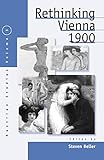Rethinking Vienna 1900 / ed. by Steven Beller.
Material type: TextSeries: Austrian and Habsburg Studies ; 3Publisher: New York ; Oxford : Berghahn Books, [2001]Copyright date: ©2001Description: 1 online resource (304 p.)Content type:
TextSeries: Austrian and Habsburg Studies ; 3Publisher: New York ; Oxford : Berghahn Books, [2001]Copyright date: ©2001Description: 1 online resource (304 p.)Content type: - 9781571811400
- 9781782384786
- 943.6/13 23
- DB851 .R43 2012
- online - DeGruyter
| Item type | Current library | Call number | URL | Status | Notes | Barcode | |
|---|---|---|---|---|---|---|---|
 eBook
eBook
|
Biblioteca "Angelicum" Pont. Univ. S.Tommaso d'Aquino Nuvola online | online - DeGruyter (Browse shelf(Opens below)) | Online access | Not for loan (Accesso limitato) | Accesso per gli utenti autorizzati / Access for authorized users | (dgr)9781782384786 |
Frontmatter -- CONTENTS -- ILLUSTRATIONS -- PREFACE -- CONTRIBUTORS -- INTRODUCTION -- Chapter 1 VIENNA 1900 REVISITED Paradigms and Problems -- Chapter 2 RETHINKING THE LIBERAL LEGACY -- Chapter 3 FIN DE SIÈCLE OR JAHRHUNDERTWENDE The Question of an Austrian Sonderweg -- Chapter 4 THEODOR HERZL AND RICHARD VON SCHAUKAL Self-Styled Nobility and the Sources of Bourgeois Belligerence in Prewar Vienna -- Chapter 5 MARGINALIZATIONS Politics and Culture beyond Fin-de-Siècle Vienna -- Chapter 6 FREUD’S “VIENNA MIDDLE” -- Chapter 7 POPPER’S COSMOPOLITANISM Culture Clash and Jewish Identity -- Chapter 8 A MATTER OF PROFESSIONALISM Marketing Identity in Fin-de-Siècle Vienna -- Chapter 9 THE IMAGE OF WOMEN IN PAINTING Clichés and Reality in Austria-Hungary, 1895–1905 -- Chapter 10 AFTERTHOUGHTS ABOUT FIN-DE-SIÈCLE VIENNA The Problem of Aesthetic Culture in Central Europe -- SELECTED BIBLIOGRAPHY -- INDEX
restricted access online access with authorization star
http://purl.org/coar/access_right/c_16ec
Fin-de-siècle Vienna remains a central event in the birth of the century's modern culture. Our understanding of what happened in those key decades in Central Europe at the turn of the century has been shaped in the last years by an historiography presided over by Carl Schorske's Fin de Siècle Vienna and the model of the relationship between politics and culture which emerged from his work and that of his followers. Recent scholarship, however, has begun to question the main paradigm of this school, i.e. the "failure of liberalism." This volume reflects not only a whole range of the critiques but also offers alternative ways of understanding the subject, most notably though the concept of "critical modernism" and the integration of previously neglected aspects such as the role of marginality, of the market and the larger Central and European context. As a result this volume offers novel ideas on a subject that is of unending fascination and never fails to captivate the Western imagination.
Mode of access: Internet via World Wide Web.
In English.
Description based on online resource; title from PDF title page (publisher's Web site, viewed 25. Jun 2024)


